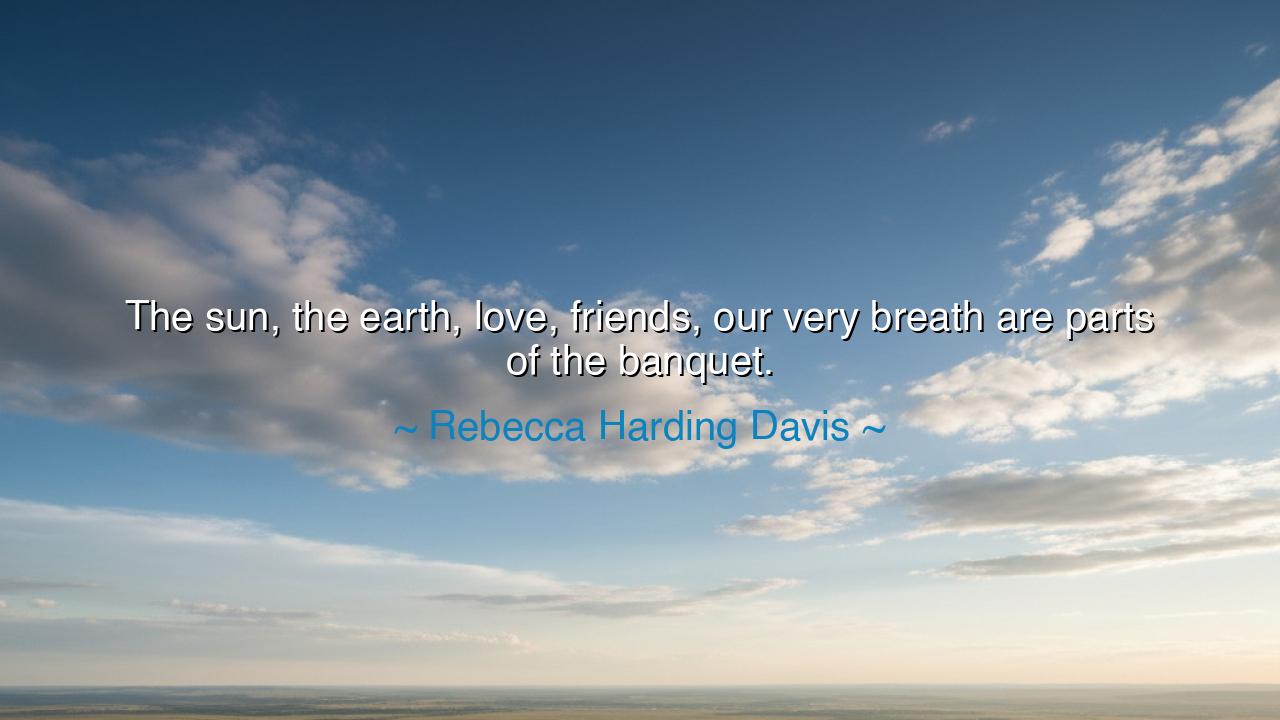
The sun, the earth, love, friends, our very breath are parts of






Hear the words of Rebecca Harding Davis: “The sun, the earth, love, friends, our very breath are parts of the banquet.” This is no ordinary sentence; it is a hymn to life itself. Davis, a writer of the nineteenth century who often turned her gaze upon the struggles and dignity of common lives, here lifts our eyes to see that existence itself is a feast laid before us. The banquet is not only in the halls of kings or in the wealth of the fortunate — it is spread before every soul in the warmth of the sun, the steadiness of the earth, the sweetness of love, the fellowship of friends, and the miracle of our own breath.
The ancients often spoke of life as a table laid by the divine. In Homer’s verses, mortals feasted with the gods, and in the Hebrew psalms, the Lord “prepares a table before me in the presence of my enemies.” To call existence a banquet is to remind us that life is not mere survival, but abundance. Every day we sit at this eternal table, whether we notice it or not. The light of the sun that nourishes crops, the soil of the earth that yields food, the bonds of love that warm the heart, the presence of friends that sustain the spirit, and the unseen gift of breath that keeps us alive — all of these are dishes of the feast, served freely, without price.
Davis’s words carry a tone of both wonder and gratitude. Too often humanity looks for joy in distant things — wealth, power, glory — and forgets that the banquet of life has already been set before them. The beggar on the street may not dine in marble halls, yet he feels the sun upon his skin, breathes the same air as kings, and may yet taste the sweetness of friendship. The wise know that the feast is not in what man hoards, but in what man receives with reverence. To awaken to this truth is to step out of poverty of spirit and into the abundance of being.
Consider the story of Epictetus, the Stoic philosopher born into slavery. He had nothing — no possessions, no title, no freedom of movement — and yet he taught that the soul could always choose gratitude. Though chained, he looked upon the sun and felt its warmth; though poor, he drew strength from friends who shared his path; though oppressed, he still rejoiced in the power of breath. His philosophy taught that life’s true banquet cannot be stolen, for it is not found in gold, but in the eternal gifts given to all.
The beauty of Davis’s quote is its inclusion of both the grand and the humble. The sun and the earth are cosmic in their majesty, older than time, sustaining all life. Yet love and friends are intimate, personal, touching us in the tender places of the heart. And our breath, invisible and unnoticed, is the smallest and yet most constant gift of all. To call each of these “parts of the banquet” is to say: greatness and simplicity together form the feast of existence. Miss one, and the table is incomplete.
The lesson is clear: do not let your days pass in blindness to the abundance around you. The banquet is already here. Give thanks for the sun that rises each morning. Walk upon the earth with reverence. Treasure your friends, and nurture love wherever it is found. And when you breathe — pause, even for a moment, to feel awe at the miracle of it. This awareness transforms life from burden into blessing, from drudgery into celebration.
Practical action is simple yet profound. Begin each day with gratitude — name aloud one part of the banquet you are thankful for: perhaps the light, perhaps the presence of a friend, perhaps simply the air filling your lungs. In doing this, you train your soul to recognize the feast already spread before you. Share your portion with others: offer kindness, extend love, become a friend to the lonely. For the banquet grows richer the more it is shared, and none need leave the table hungry.
So let the words of Rebecca Harding Davis echo in your spirit: “The sun, the earth, love, friends, our very breath are parts of the banquet.” Live not as a beggar in a world of abundance, but as a guest at the eternal feast. Take, give thanks, and share — for this is the true art of living, and the truest form of joy.






AAdministratorAdministrator
Welcome, honored guests. Please leave a comment, we will respond soon